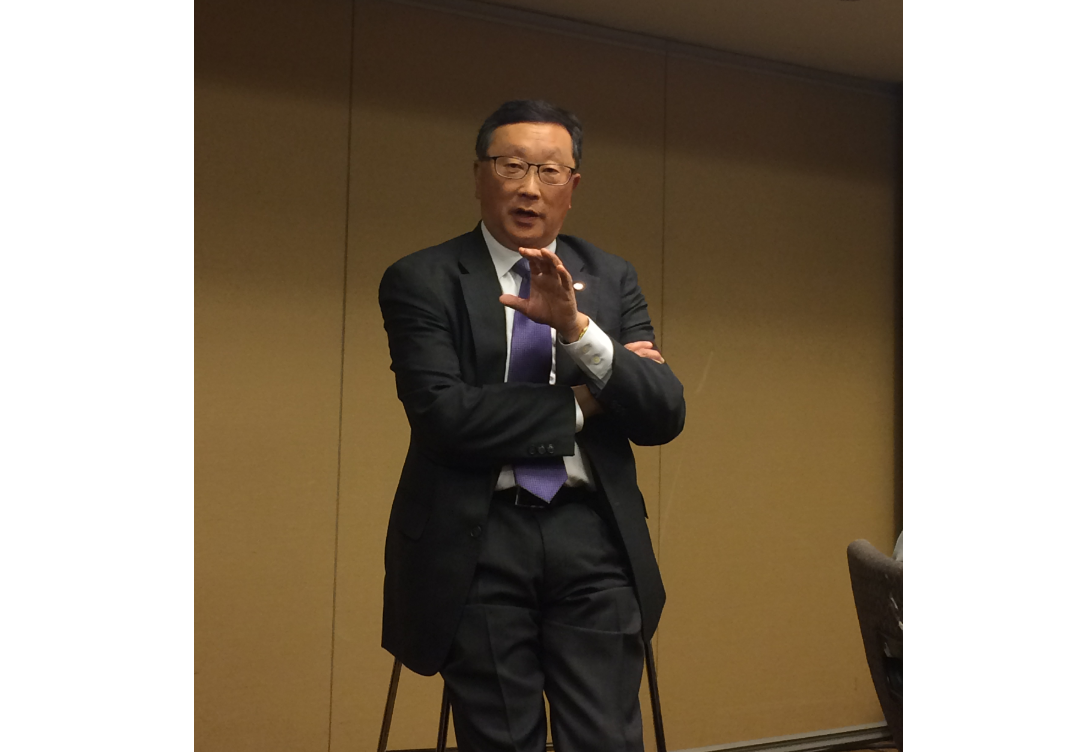
Credit: Wireless Week/Diana Goovaerts
Telecom titan Nokia made waves in May when it announced its return to the device space via a 10-year licensing agreement with HMD Global. And now Blackberry has me wondering whether it will do something similar with its ailing handset business.
In a media question and answer session at BlackBerry’s Security Summit on Tuesday, CEO John Chen reluctantly answered a handful of questions on handsets. What he said was interesting, to say the least.
“There’s also another avenue of handset business,” Chen said. “You can sustain it as a business by not having to make every handset. I’ll just leave it at that. We could license our technology and know-how and IT in how people make handsets, maybe even the name for that matter.”
“When I segmented out the device business, I didn’t call it a device business,” Chen continued. “It’s a mobile solutions business. So whether it’s crypto or antenna, we are willing to license it. There will be a component in mobile that becomes revenue. As long as hardware makes money I don’t care whether it’s 30 percent, or 40 percent, or 50 percent of our business. Making money with our handset business is our number one priority.”
But according to Chen, the fate of BlackBerry’s handsets has yet to be decided.
“As long as I could stay in the handset business in which I provide a strong secure entry point, as well as provide our customer base continuity and a soft landing, so to speak, I should do that. But if I can’t make money and do that, then I’m just kidding myself,” Chen said. “When I said we’re not going to produce Classic any more, everyone made it sound like we’re getting out of the hardware business. It could be wishful thinking on a lot of people’s part but it’s not true. Or not yet at least.”
The remarks come amid reports that BlackBerry is preparing to release two or three new mid-range, mid-priced Android smartphones in the coming quarters. The company is reportedly trying to find a happy medium after the higher-priced, premium Priv failed to meet expectations.
In the three months ended May 31, 2016, Priv sales dropped to 500,000 units and Blackberry’s mobile segment brought in just $152 million in revenue.
However, Chen’s comments also come on the heels of Nokia’s decision to jump back into the handset business via a licensing agreement with HMD. In a ten-year agreement, HMD, which purchased part of Microsoft’s feature phone business, agreed to create Nokia-branded phones and tablets and pay royalties to Nokia Technologies.
Like BlackBerry, Nokia is a company that was once a huge name in the device space. But also like Nokia, BlackBerry’s success has tumbled down a steep slope with the rise of Apple, Samsung and other smartphone titans. While Nokia opted to sell its ailing phone portfolio to Microsoft in 2013, BlackBerry has – for better or worse – hung on.
Now, Nokia is looking to make a handset comeback through licensing. Could a similar path be the answer to BlackBerry’s smartphone woes?




